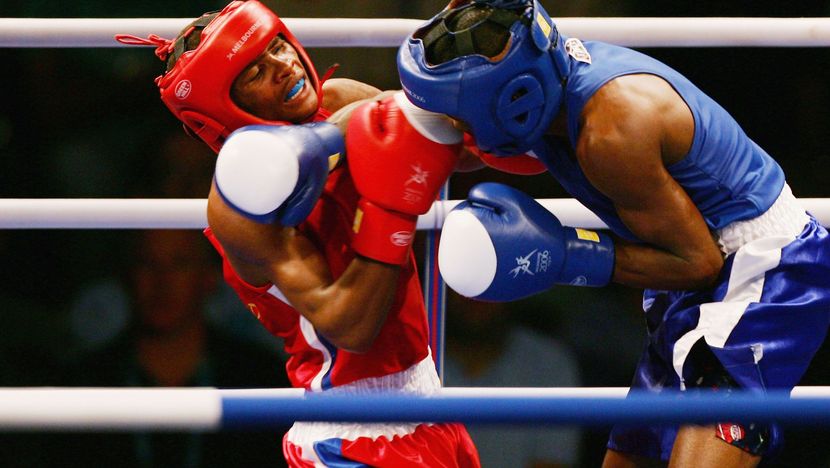
Where Are They Now: Simanga Shiba
We continue the series of articles exploring the journeys of past, present, and future athletes who have participated in a Commonwealth Games event. Here, we reconnect with Eswatini’s Simanga Shiba, who made history at the Melbourne 2006 Commonwealth Games with a bronze medal in boxing.
In Melbourne, the then-20-year-old light flyweight boxer fought his way into the medal rounds, defying expectations and showing grit against a strong field. When his hand was raised for bronze, he became only the third athlete in Eswatini’s history to stand on a Commonwealth Games podium, and the first in boxing since 1982. It was a moment that gave his country a reason to celebrate on the international stage.
What are the standout moments from your time as an athlete in the Commonwealth Games?
"The 2006 Melbourne Commonwealth Games stand out as the highlight of my boxing career. Winning bronze in the men’s light flyweight division was an unforgettable achievement, both for me and for my country. It was an honour to step onto the podium representing Eswatini."
How has your view on your sport and accomplishments shifted since your Commonwealth Games experience?
"Since Melbourne, I have realised that sport gave me far more than medals. My achievements opened doors, including a permanent job in the military after I passed the required physical training. I went on to win bronze at the 2007 Africa Championships in Madagascar and silver at the Region V Youth Games in Botswana, where I was also named Best Boxer of the Tournament. These successes gave me perspective on the value of discipline and consistency."
How has your life and career changed since the Commonwealth Games, both in and out of sport?
"In sport, I now work as a part-time boxing trainer and coach at Ingwe Boxing Club, an army-based club, and I assist the national team when called upon. I also qualified in 2024 as a national referee and judge through an IBA-certified programme. Outside of the ring, I serve as a military officer in Eswatini and take on community responsibilities, including working as a football club security officer to help maintain discipline and order during tournaments."
Can you talk about the challenges and victories you have encountered since the Commonwealth Games and how they shaped your journey?
"After Melbourne I was awarded an Olympic Scholarship and qualified for Beijing 2008. However, once I joined the military in 2008 I lost that scholarship, and my focus shifted more towards my new responsibilities than my boxing career. It was difficult to balance both, and I regret not being able to continue at the highest level. But I remain proud of my achievements, particularly the medals I won in Africa and the recognition of being named Best Boxer in 2007. "
Have you stayed active in your sport or sports community after the Commonwealth Games? If yes, what role do you play?
"Yes, I am still very active. At Ingwe Boxing Club I serve as an assistant trainer and coach, and I support the Eswatini national team even though I do not hold a formal coaching certificate. At community level, I help train athletes and also work as a marshal at football matches, ensuring peace and order."
Tell us about projects or causes you are passionate about or working on.
"When I am off duty, I sometimes return to Malkerns Boxing Club, where I grew up, to train children. My dream is to one day coach boxers who can reach the Commonwealth Games if the right resources and support are in place."
In what ways have you used your Commonwealth Games experience to motivate and guide the next generation or those facing similar challenges?
"I always tell young athletes that discipline and focus are essential. Nothing comes easily, and they must be prepared to fight for their goals. I also give health talks, help with problem-solving, and share boxing skills and techniques that I learned through my own journey."
Looking back, what lessons or skills from your Commonwealth Games journey have been valuable in your life beyond sport?
"The Games taught me personal discipline and how to handle pressure in all areas of life. They also taught me teamwork, as I learned to work alongside different coaches and athletes and to share experiences for the benefit of others."
Can you share a personal or professional achievement post-Commonwealth Games that you take pride in?
"I take pride in my career as a military officer. Passing the physical training to become a soldier in Eswatini was not easy, but I achieved it, and it has given me a stable and fulfilling career."
The recent King’s Baton Relay passed through your country. Did it bring back memories of your own Commonwealth Games journey, and what does the Baton’s message mean to you today?
"The King’s Baton Relay reminded me of Melbourne 2006 and my bronze medal. It has been almost 20 years since Eswatini last won a medal at the Games, and that fact stays with me. The Baton represents togetherness among nations, and it gives me joy to be reminded of what sport can achieve. I hope that one day I can help Eswatini win another medal with the right resources and support."
With the 2026 Commonwealth Games coming up, what are you most looking forward to seeing?
"I hope that Eswatini can bring home another medal. I look forward to seeing stronger support systems such as high-performance scholarships and better preparation for athletes. There is real potential in my country, but the lack of resources makes it difficult to fulfil. Athletes still struggle with basics like training kits and competition gear."
If you could give one piece of advice to athletes preparing for 2026, what would it be?
"My advice is simple: fight for your country and enjoy boxing."